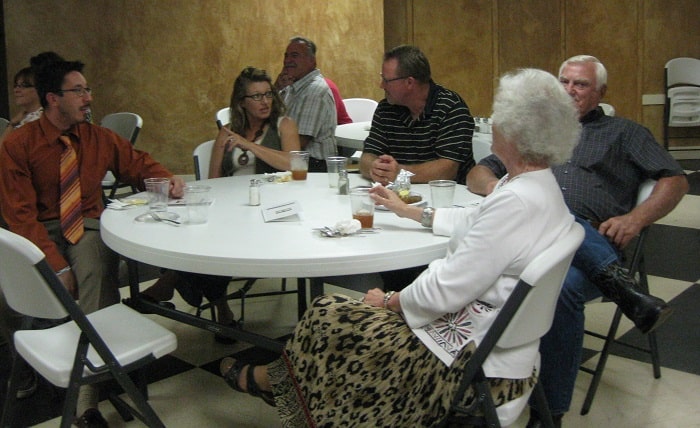
In a small town, you have lots of chances to network. Photo by Becky McCray.
If you ask, most business owners will acknowledge that connecting with others is a crucial element in their success.
Of course, we know how important networking is in building a client base. Yet it also can help you answer questions on how to start and operate your business, as well as help you find your business opportunity.
Effective networking offers guidance in the regulatory steps you need to take when you start. It also helps you figure out who to call when the lights don’t work.
Networking can help you select the banker, accountant and insurance agent you should put on your team. And if you have a problem, your network can help come up with a solution, or at least get you to the next step.
Networking is not new. If you read business literature, you will see articles on a regular basis on the importance of networking. What those articles don’t always include is how to do it effectively.
So what are key elements in building an effective network?
Effective networking can be broken into three basic steps. You have advance preparation, a networking event and follow-up.
As you prepare, think about your current questions or future issues for which you might need help. Set a goal of what you would like to have accomplished when the event ends.
However, don’t get focused on one specific question. Good networkers always are listening for who may be a future resource. Remember, you want a support group who can help today and tomorrow, next month and next year.
Then practice your introduction and 30-second elevator speech (a brief summary that defines you and your product or service) and get your business cards ready.
During the event, remember that you are not there to socialize. You have a goal. Find people you don’t know and get to know them. Leave your card with them. Listen more than you talk. Finally, being a good networker means helping others more than they help you.
Three simple tips can help:
- Most networking occurs during the first 30 to 45 minutes of the event, so get there early.
- If you find that going up to someone you don’t know is hard for you, stand by the food and let them come to you.
- If this is a no-host event, take over that role. Introduce people you have just met to others you already know.
Finally, after the event, follow up on promises. This is the time to recontact people and have those longer conversations. Also, find ways to stay in touch. And critique how you did so you are better prepared for the next networking opportunity.
Networking and building a network isn’t a contest. No one is judged on the size of your network. What counts is how well it helps you run your business.
Good networking is hard. It takes time and practice. It may feel uncomfortable at first. Watch and listen how others do it.
Remember, networking and building your network can be the key to your business success.
Glenn Muske is the Rural and Agribusiness Enterprise Development Specialist at the North Dakota State University Extension Service – Center for Community Vitality. Follow Glenn on Twitter: @gmuske










